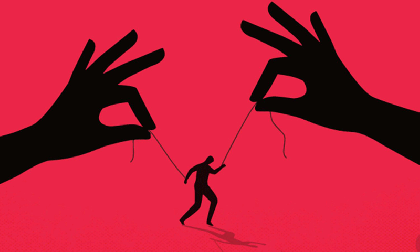Indicators of Manipulation in a Relationship
In relationships, controlling behaviours can be covert and gradually infiltrate your life, making them hard to identify. Acknowledging these behaviours is vital for sustaining a healthy relationship and self-welfare. This guide outlines various manipulative tactics, how to spot them, and approaches to handle them.
1. Undermining Reality (Gaslighting)
Gaslighting is a psychological tactic that involves making your partner question their memories, perceptions, or decisions. Common phrases include "You're overreacting," "That didn't happen," or "You're just imagining it." This can severely impact self-esteem and confidence in one’s judgement.
Identification
Doubting your own reality or feeling perplexed about past occurrences in your relationship might indicate gaslighting. Other signs are feeling isolated, deception, or belittlement of your experiences.
2. Inducing Guilt
Here, guilt is used to control or sway someone’s actions, often with remarks like "Look at what I've done for you," or "You clearly don't care about my feelings."
Identification
If you often feel apprehensive about upsetting your partner, or if actions are driven by guilt rather than genuine desire, this may signal guilt induction.
3. Withholding Communication (Silent Treatment)
This passive-aggressive tactic involves ignoring or not communicating with your partner as a form of punishment, causing emotional strain.
Identification
If your partner consistently avoids conversation, particularly post-conflict, or employs silence punitively, it indicates manipulative behaviour.
4. Excessive Adoration (Love Bombing)
Love bombing is an excessive outpouring of affection and attention to gain control or influence. It typically involves constant messaging, lavish gifts, and excessive praise.
Identification
If the intense affection is overpowering or appears manipulative, it could be love bombing. It’s concerning if such attention vanishes abruptly or justifies abusive behaviour.
5. Social Seclusion
Manipulators often try to cut off their partners from their support network by criticising friends and family, dominating their time, or relocating.
Identification
A dwindling social circle or feeling discouraged from meeting loved ones might signify efforts to isolate you.
6. Manipulating Finances
This type of manipulation involves one partner exerting excessive control over the other's financial resources. It can manifest as overseeing all monetary expenditures, restricting access to joint bank accounts, or unilaterally making financial choices without consulting the other.
Identification
Experiencing a lack of control over your finances or frequently having to explain your spending can indicate financial manipulation.
7. Use of Threats and Coercion
In this scenario, a partner may employ threats or ultimatums to instil fear and enforce compliance. This could range from threats to end the relationship to self-harm, or other forms of psychological manipulation.
Identification
Constantly walking on eggshells to avoid upsetting your partner or facing frequent "do this or else" situations are warning signs.
8. Excessive Dependency
This occurs when one partner overly depends on the other for emotional, physical, or financial support, often to the detriment of the other's autonomy and well-being. This could involve a need to be a part of every aspect of the other's life, thereby burdening them with their happiness and welfare.
Identification
Feeling burdened by your partner's incessant demands for attention and support, to the extent that it interferes with your own life and responsibilities, may indicate excessive dependency.
9. Blame Shifting
This behaviour includes a partner consistently attributing the blame for their actions or issues in the relationship to the other person. Typical expressions might be "This is because of what you did" or "Had you not done that, this wouldn't have happened."
Identification
Notice this pattern if you often find yourself blamed for problems, regardless of the circumstances, or feeling accountable for your partner's behaviours and feelings.
10. Playing the Victim
In this manipulation tactic, a partner consistently portrays themselves as the victim in various situations to elicit sympathy and control the other. This strategy diverts attention from their actions to the supposed failings or lack of support from their partner.
Identification
If your partner frequently assumes the role of a victim during conflicts or to deflect from their behaviour, it's a sign of manipulative tactics.
11. Inconsistent Reinforcement
This involves a sporadic mix of rewards and penalties to create a sense of uncertainty and reliance. It can manifest as alternating periods of kindness and harshness, or affection and neglect.
Identification
If your relationship is marked by erratic patterns of positive and negative interactions, leaving you constantly uneasy and on edge, it may be a sign of inconsistent reinforcement.
12. 'Negging'
'Negging' refers to a subtle yet harmful practice in which one partner gives seemingly complimentary remarks that actually contain subtle insults. This tactic aims to erode the other's self-esteem, increasing their emotional reliance and desire for the partner's approval. Examples include remarks like, "You're quite intelligent for someone who rarely reads," or "It's admirable how little you care about your appearance."
Identification
You can spot this behaviour if compliments from your partner often make you feel belittled or less self-assured. A constant need to seek their validation or feeling unworthy might indicate 'negging'.
The Detrimental Effects of Manipulative Actions
These actions can severely impact the victim's psychological well-being, leading to:
- Diminished Self-Esteem: Continuous criticism and undermining can foster self-doubt and lower self-respect.
- Anxiety and Depression: The emotional turmoil from manipulation can exacerbate mental health problems.
- Dependency: Tactics like isolation and excessive adoration can create an unhealthy reliance on the manipulator.
- Trust Issues: Experiencing manipulation can impede trust in future relationships.
Dealing with Manipulative Behaviours
Acknowledging manipulation is crucial in dealing with it. Here’s how to approach it in a relationship:
- Recognise the Problem: Regularly evaluate your feelings and relationship health. If manipulative behaviours are present, confront their impact on you. Avoid denial.
- Open Communication: If safe, express your concerns to your partner. Clearly identify the manipulative actions and their effects. Avoid falling into a cycle of blame or dependence. Maintain your autonomy and viewpoint.
- Set Boundaries: Clearly define what is acceptable for you in the relationship.
- Seek Support: Don't hesitate to reach out to friends, family, or a therapist. A support network is essential for advice and emotional backing.
- Prioritise Self-Care: Focus on activities that enhance your self-esteem and independence.
- Assess the Relationship: In some cases, leaving the relationship might be necessary, especially if the partner refuses to recognise or alter their behaviour.
Conclusion
Manipulative behaviours in a relationship are damaging and can lead to lasting emotional harm. Recognising these behaviours is the first step in addressing them. Communication, boundary-setting, and support are key. Always prioritise your well-being and evaluate the health of the relationship. Healthy relationships should be founded on mutual respect, trust, and understanding, not manipulation and control.



















